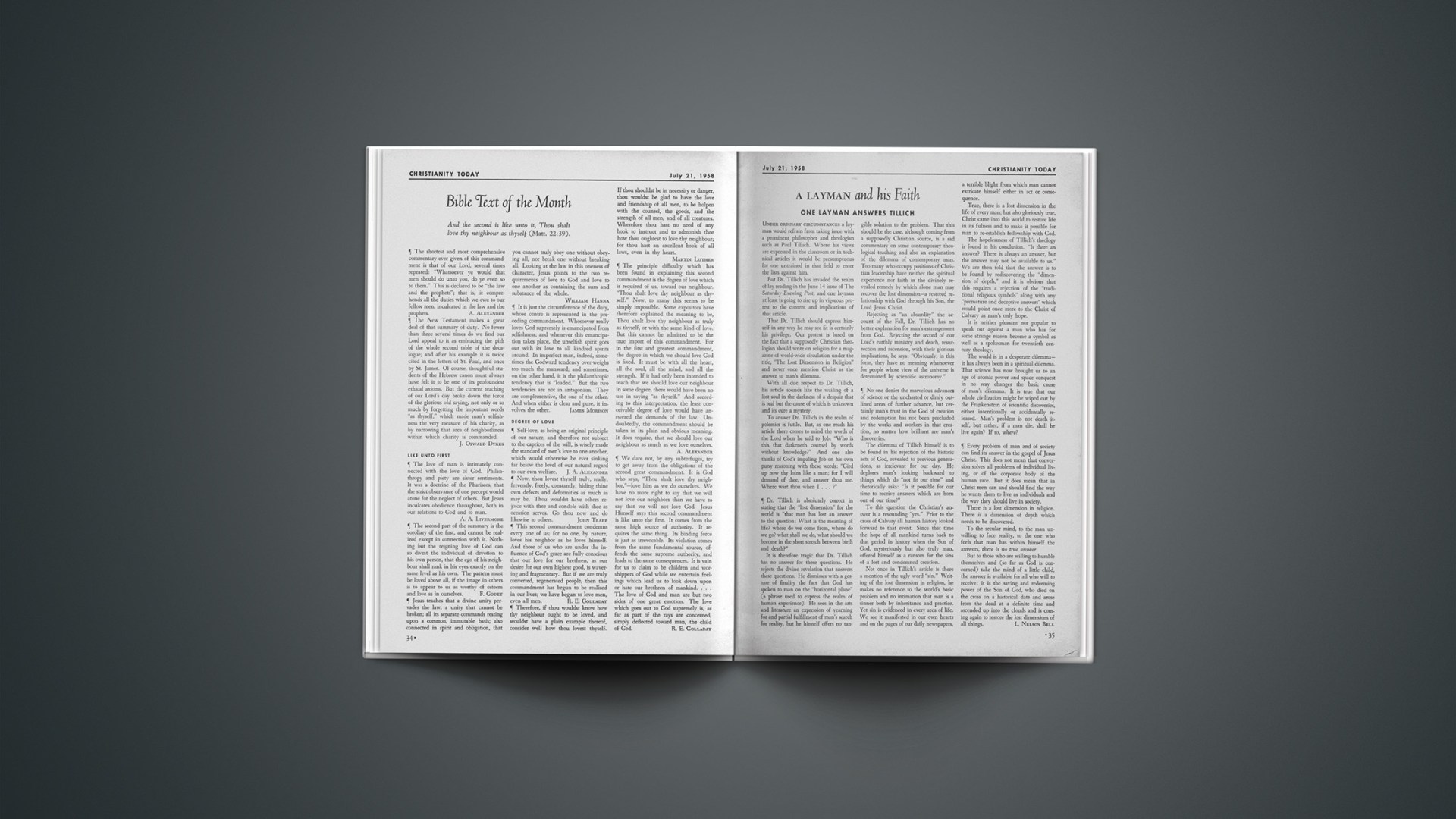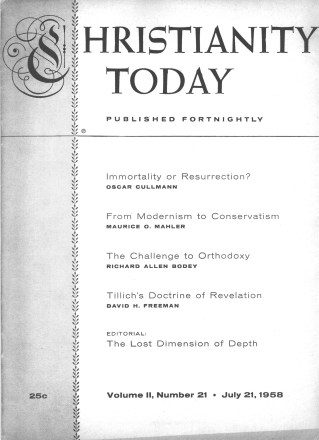One Layman Answers Tillich
Under ordinary circumstances a layman would refrain from taking issue with a prominent philosopher and theologian such as Paul Tillich. Where his views are expressed in the classroom or in technical articles it would be presumptuous for one untrained in that field to enter the lists against him.
But Dr. Tillich has invaded the realm of lay reading in the June 14 issue of The Saturday Evening Post, and one layman at least is going to rise up in vigorous protest to the content and implications of that article.
That Dr. Tillich should express himself in any way he may see fit is certainly his privilege. Our protest is based on the fact that a supposedly Christian theologian should write on religion for a magazine of world-wide circulation under the title, “The Lost Dimension in Religion” and never once mention Christ as the answer to man’s dilemma.
With all due respect to Dr. Tillich, his article sounds like the wailing of a lost soul in the darkness of a despair that is real but the cause of which is unknown and its cure a mystery.
To answer Dr. Tillich in the realm of polemics is futile. But, as one reads his article there comes to mind the words of the Lord when he said to Job: “Who is this that darkeneth counsel by words without knowledge?” And one also thinks of God’s impaling Job on his own puny reasoning with these words: “Gird up now thy loins like a man; for I will demand of thee, and answer thou me. Where wast thou when I …?”
Dr. Tillich is absolutely correct in stating that the “lost dimension” for the world is “that man has lost an answer to the question: What is the meaning of life? where do we come from, where do we go? what shall we do, what should we become in the short stretch between birth and death?”
It is therefore tragic that Dr. Tillich has no answer for these questions. He rejects the divine revelation that answers these questions. He dismisses with a gesture of finality the fact that God has spoken to man on the “horizontal plane” (a phrase used to express the realm of human experience). He sees in the arts and literature an expression of yearning for and partial fulfillment of man’s search for reality, but he himself offers no tangible solution to the problem. That this should be the case, although coming from a supposedly Christian source, is a sad commentary on some contemporary theological teaching and also an explanation of the dilemma of contemporary man. Too many who occupy positions of Christian leadership have neither the spiritual experience nor faith in the divinely revealed remedy by which alone man may recover the lost dimension—a restored relationship with God through his Son, the Lord Jesus Christ.
Rejecting as “an absurdity” the account of the Fall, Dr. Tillich has no better explanation for man’s estrangement from God. Rejecting the record of our Lord’s earthly ministry and death, resurrection and ascension, with their glorious implications, he says: “Obviously, in this form, they have no meaning whatsoever for people whose view of the universe is determined by scientific astronomy.”
No one denies the marvelous advances of science or the uncharted or dimly outlined areas of further advance, but certainly man’s trust in the God of creation and redemption has not been precluded by the works and workers in that creation, no matter how brilliant are man’s discoveries.
The dilemma of Tillich himself is to be found in his rejection of the historic acts of God, revealed to previous generations, as irrelevant for our day. He deplores man’s looking backward to things which do “not fit our time” and rhetorically asks: “Is it possible for our time to receive answers which are born out of our time?”
To this question the Christian’s answer is a resounding “yes.” Prior to the cross of Calvary all human history looked forward to that event. Since that time the hope of all mankind turns back to that period in history when the Son of God, mysteriously but also truly man, offered himself as a ransom for the sins of a lost and condemned creation.
Not once in Tillich’s article is there a mention of the ugly word “sin.” Writing of the lost dimension in religion, he makes no reference to the world’s basic problem and no intimation that man is a sinner both by inheritance and practice. Yet sin is evidenced in every area of life. We see it manifested in our own hearts and on the pages of our daily newspapers, a terrible blight from which man cannot extricate himself either in act or consequence.
True, there is a lost dimension in the life of every man; but also gloriously true, Christ came into this world to restore life in its fulness and to make it possible for man to re-establish fellowship with God.
The hopelessness of Tillich’s theology is found in his conclusion. “Is there an answer? There is always an answer, but the answer may not be available to us.” We are then told that the answer is to be found by rediscovering the “dimension of depth,” and it is obvious that this requires a rejection of the “traditional religious symbols” along with any “premature and deceptive answers” which would point once more to the Christ of Calvary as man’s only hope.
It is neither pleasant nor popular to speak out against a man who has for some strange reason become a symbol as well as a spokesman for twentieth century theology.
The world is in a desperate dilemma—it has always been in a spiritual dilemma. That science has now brought us to an age of atomic power and space conquest in no way changes the basic cause of man’s dilemma. It is true that our whole civilization might be wiped out by the Frankenstein of scientific discoveries, either intentionally or accidentally released. Man’s problem is not death itself, but rather, if a man die, shall he live again? If so, where?
Every problem of man and of society can find its answer in the gospel of Jesus Christ. This does not mean that conversion solves all problems of individual living, or of the corporate body of the human race. But it does mean that in Christ men can and should find the way he wants them to live as individuals and the way they should live in society.
There is a lost dimension in religion. There is a dimension of depth which needs to be discovered.
To the secular mind, to the man unwilling to face reality, to the one who feels that man has within himself the answers, there is no true answer.
But to those who are willing to humble themselves and (so far as God is concerned) take the mind of a little child, the answer is available for all who will to receive: it is the saving and redeeming power of the Son of God, who died on the cross on a historical date and arose from the dead at a definite time and ascended up into the clouds and is coming again to restore the lost dimensions of all things.
L. NELSON BELL










